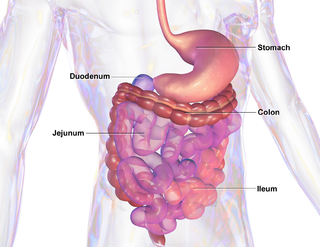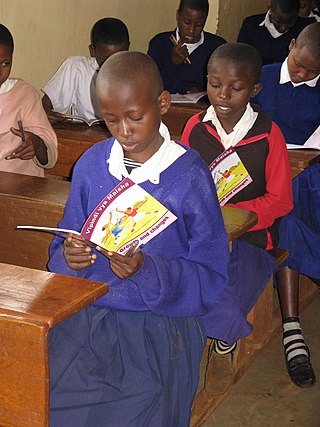
Hygiene is a set of practices performed to preserve health. According to the World Health Organization (WHO), "Hygiene refers to conditions and practices that help to maintain health and prevent the spread of diseases." Personal hygiene refers to maintaining the body's cleanliness. Hygiene activities can be grouped into the following: home and everyday hygiene, personal hygiene, medical hygiene, sleep hygiene, and food hygiene. Home and every day hygiene includes hand washing, respiratory hygiene, food hygiene at home, hygiene in the kitchen, hygiene in the bathroom, laundry hygiene, and medical hygiene at home.

An intestinal parasite infection is a condition in which a parasite infects the gastro-intestinal tract of humans and other animals. Such parasites can live anywhere in the body, but most prefer the intestinal wall.

Community-led total sanitation (CLTS) is an approach used mainly in developing countries to improve sanitation and hygiene practices in a community. The approach tries to achieve behavior change in mainly rural people by a process of "triggering", leading to spontaneous and long-term abandonment of open defecation practices. It focuses on spontaneous and long-lasting behavior change of an entire community. The term "triggering" is central to the CLTS process: It refers to ways of igniting community interest in ending open defecation, usually by building simple toilets, such as pit latrines. CLTS involves actions leading to increased self-respect and pride in one's community. It also involves shame and disgust about one's own open defecation behaviors. CLTS takes an approach to rural sanitation that works without hardware subsidies and that facilitates communities to recognize the problem of open defecation and take collective action to clean up and become "open defecation free".
Blood:Water Mission is an international nonprofit that partners with African community-driven organizations to end health disparities caused by the HIV/AIDS and water crises. It is based in Nashville, Tennessee, US, and is led by Jake Smith.

The Sustainable Sanitation Alliance (SuSanA) is a loose network of organizations who are "working along the same lines towards achieving sustainable sanitation". It began its work in 2007, one year before the United Nations International Year of Sanitation in 2008. The intention of creating SuSanA was to have a joint label for the planned activities for 2008 and to align the various organizations for further initiatives.

Water supply and sanitation sector in Ghana is a sector which is in charge of the supply of healthy water and also improve the sanitation of water bodies in the country Ghana.
The Country Development Unit is a non-political and non-governmental organization in Afghanistan, established in early 1992 to participate in the rehabilitation and development of the war-torn country. It has registered with the MoP and is a member of the Afghan NGOs' Coordination Bureau.

Global Hand washing Day (GHD) is an international hand washing promotion campaign to motivate and mobilize people around the world to improve their hand washing habits. Washing hands at critical points both during the day and washing with soap are important. In 2008, Global Handwashing Day was celebrated for the first time. This day aims to make people around the world aware of the importance of washing their hands with soap in order to prevent diseases and infections. To commemorate this special day, over 120 million children in 70 countries were encouraged to practice handwashing with soap. Since then, the movement has built momentum, garnering support from various stakeholders such as governments, schools, NGOs, and private firms.
Africa AHEAD is a non-governmental organization working primarily in sub-Saharan Africa. AHEAD stands for Applied Health, Education, And Development.
The Water and Sanitation Extension Program(WASEP) is an initiative by the Aga Khan Planning and Building Service, Pakistan to provide clean drinking water and hygienic sanitation facilities to prevent the high incidence of waterborne diseases in disadvantaged communities of Pakistan.
Humanitarian Initiative Just Relief Aid (HIJRA) is an African humanitarian organization focused on the implementation of emergency and resilience programming in the greater Horn of Africa; Somalia, Kenya and Uganda.

WASH is an acronym that stands for "water, sanitation and hygiene". It is used widely by non-governmental organizations and aid agencies in developing countries. The purposes of providing access to WASH services include achieving public health gains, improving human dignity in the case of sanitation, implementing the human right to water and sanitation, reducing the burden of collecting drinking water for women, reducing risks of violence against women, improving education and health outcomes at schools and health facilities, and reducing water pollution. Access to WASH services is also an important component of water security. Universal, affordable and sustainable access to WASH is a key issue within international development and is the focus of the first two targets of Sustainable Development Goal 6. Targets 6.1 and 6.2 aim at equitable and accessible water and sanitation for all. In 2017, it was estimated that 2.3 billion people live without basic sanitation facilities and 844 million people live without access to safe and clean drinking water.

School hygiene or school hygiene education is a healthcare science, a form of the wider school health education. The primary aims of school hygiene education is to improve behavior through useful practices connected to personal, water, food, domestic and public hygiene. Also, it aims to protect water and food supplies and to safely manage environmental factors.
The Water Supply and Sanitation Collaborative Council (WSSCC) was a United Nations-hosted organization contributing to Sustainable Development Goal 6, Target 6.2 on sanitation and hygiene. It was established in 1990 and closed at the end of 2020. WSSCC advocated for improved sanitation and hygiene, with a focus on the needs of women, girls and people in vulnerable situations.

Open defecation is the human practice of defecating outside rather than into a toilet. People may choose fields, bushes, forests, ditches, streets, canals, or other open spaces for defecation. They do so either because they do not have a toilet readily accessible or due to traditional cultural practices. The practice is common where sanitation infrastructure and services are not available. Even if toilets are available, behavior change efforts may still be needed to promote the use of toilets. 'Open defecation free' (ODF) is a term used to describe communities that have shifted to using toilets instead of open defecation. This can happen, for example, after community-led total sanitation programs have been implemented.
Menstrual Hygiene Day is an annual awareness day on May 28 to highlight the importance of good menstrual hygiene management (MHM) at a global level. It was initiated by the German-based NGO WASH United in 2013 and observed for the first time in 2014.

Menstrual hygiene management (MHM) or menstrual health and hygiene (MHH) refers to access to menstrual hygiene products to absorb or collect the flow of blood during menstruation, privacy to change the materials, and access to facilities to dispose of used menstrual management materials. It can also include the "broader systemic factors that link menstruation with health, well-being, gender equality, education, equity, empowerment, and rights". Menstrual hygiene management can be particularly challenging for girls and women in developing countries, where clean water and toilet facilities are often inadequate. Menstrual waste is largely ignored in schools in developing countries, despite it being a significant problem. Menstruation can be a barrier to education for many girls, as a lack of effective sanitary products restricts girls' involvement in educational and social activities.

The African Ministers' Council on Water (AMCOW) (French: Conseil des Ministres Africains Chargés de L'eau), is considered by the African Union as the support mechanism for its Specialised Technical Committee (STC) to drive achievement in the water and sanitation sectors. It is a regional development network of 55 African countries that advances socioeconomic development and the abolition of poverty through effective cooperation, management of water supply services, and provision of the continent's water resources to its members.











